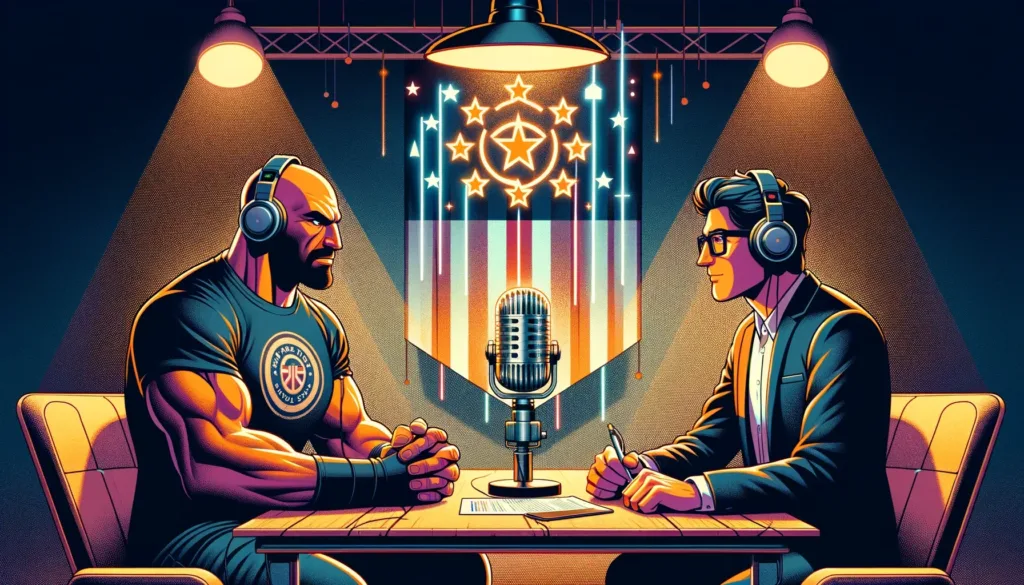
Adam Conover
Adam Conover is an American comedian, writer, and television host best known for creating and hosting the educational comedy show "Adam Ruins Everything." Born on March 2, 1983, in Wading River, New York, Conover grew up in a family deeply engaged in the arts and sciences. He graduated from Bard College with a bachelor's degree in philosophy, where he also became actively involved in sketch comedy. Conover started his career as a stand-up comedian and later joined CollegeHumor, where he gained recognition for his unique blend of comedy and educational content. "Adam Ruins Everything," which began on CollegeHumor and then moved to truTV, showcases Conover debunking common misconceptions and cultural myths, often with a humorous twist. Aside from his signature show, Conover has appeared in various television projects and continues to use comedy as a tool to educate and provoke thought. His approachable style and commitment to fact-checking have made him a popular figure in both entertainment and educational circles.
Books Mentioned on The Joe Rogan Experience (JRE) #1282 - Adam Conover
Exploring Trans-Athletes in Competitive Sports: A Discussion Between Joe Rogan and Adam Conover
Joe Rogan and Adam Conover delve into the nuanced and often controversial topic of trans-athletes in competitive sports. They explore the concept of fairness, acknowledging the inherent challenges in creating perfectly equitable sporting environments. Conover highlights the importance of inclusivity, suggesting that sports should evolve to accommodate trans individuals fairly.
The Pistorius Case and Mechanical Advantages
The conversation shifts to the case of Oscar Pistorius, the disabled runner, and debates around mechanical advantages in sports. Rogan and Conover discuss whether Pistorius’ prosthetics provided an unfair advantage, reflecting on the broader implications for fairness in sports.
Gender Divisions in Sports and Trans Athletes
A significant portion of the discussion focuses on the complexities of gender divisions in sports, especially concerning trans athletes. Rogan raises concerns about biological males transitioning to females and competing in women’s sports, citing potential physiological advantages. Conover, while acknowledging these concerns, emphasizes the need for a more inclusive approach that accommodates trans athletes.
Hormone Therapy and Its Impact
The talk then turns to the effects of hormone therapy on trans individuals, particularly athletes. Conover shares insights from his trans friends about the profound impact of hormones, while Rogan questions the fairness of these changes in the context of competitive sports.
The Ethical Dilemma of Trans Children in Sports
A significant part of the conversation is dedicated to the ethical considerations surrounding trans children in sports. They discuss the implications of hormone therapy at a young age and its impact on a child’s future in sports and overall well-being.
Potential Solutions and Future Directions
Towards the end of the discussion, both Rogan and Conover explore potential solutions to address the challenges faced by trans athletes in sports. They consider the possibility of creating separate divisions or leagues for trans athletes, weighing the pros and cons of such an approach.
Balancing Inclusivity and Competitive Integrity
In their continued discussion, Joe Rogan and Adam Conover delve deeper into the balance between inclusivity and maintaining competitive integrity in sports. Rogan expresses concerns about the potential for unfair advantages, while Conover emphasizes the importance of not excluding trans athletes from the opportunity to compete. They both agree on the complexity of finding a middle ground that respects both fairness and inclusivity.
The Role of Science in Shaping Sports Policies
A key point of their conversation is the role of scientific research in informing sports policies regarding trans athletes. Rogan points out the need for robust scientific data to guide decisions, especially in high-stakes competitive environments. Conover adds that scientific research should also consider the psychological and social aspects of trans athletes, not just the physiological ones.
Public Perception and Media Representation
Rogan and Conover also touch upon the impact of public perception and media representation on the trans athlete debate. They discuss how misinformation and sensationalism can skew public understanding and the importance of having informed discussions based on facts and empathy.
Personal Stories and Anecdotes
Throughout the conversation, both Rogan and Conover share personal stories and anecdotes that shed light on the human side of this debate. These narratives bring a personal touch to the discussion, illustrating the real-life implications of the policies and perceptions surrounding trans athletes.
Looking Ahead: The Future of Sports Inclusivity
As their conversation draws to a close, Rogan and Conover reflect on the future of sports inclusivity. They ponder the potential changes in sports regulations, the evolving understanding of gender and biology, and how these might shape the landscape of competitive sports for trans athletes. Both express hope for a more inclusive and fair sporting world, acknowledging the ongoing need for dialogue and understanding.

Joe Rogan and Adam Conover Discuss: Are Alpha and Beta Males Real?
Joe Rogan and Adam Conover engage in a thought-provoking discussion about the popular concept of ‘alpha’ and ‘beta’ males in human society. They critically examine the scientific validity of these terms, with Conover arguing that the idea of alpha and beta males does not exist in humans according to anthropologists, biologists, and sociologists. This notion, they argue, is an oversimplified way of looking at human relationships and social dynamics.
The Misuse of Evolutionary Psychology
The conversation turns to how people often misapply concepts from evolutionary psychology and biology to justify certain social behaviors and structures. They discuss how terms like ‘alpha’ and ‘beta’ are used unscientifically, particularly in the context of dating and social interactions.
Challenging Intuitive Beliefs with Science
Rogan and Conover explore the common intuitive beliefs about attraction and social hierarchies, questioning whether these are truly rooted in evolutionary biology or are more cultural constructs. They debate whether attributes like confidence, athleticism, and physical appearance are naturally attractive due to evolutionary reasons, or if these preferences are shaped by cultural and societal influences.
Social Hierarchies and Human Behavior
The discussion also covers the fluidity and context-dependency of social hierarchies in human society. They argue that humans are not organized in rigid social structures like some animal species, and a person’s social status can change based on the situation. This point challenges the fixed nature of the ‘alpha’ and ‘beta’ labels.
The Backfire Effect and Identity Protective Cognition
An interesting part of their conversation is the exploration of psychological phenomena like the backfire effect and identity protective cognition. They discuss how deeply held beliefs, such as identifying as an ‘alpha’ male, are hard to change even in the face of contradicting facts. This leads to a discussion on how personal identity can influence one’s acceptance or rejection of scientific evidence.
Ideology, Politics, and the Alpha-Beta Debate
Rogan and Conover touch upon how the alpha-beta male debate has been politicized and ideologized, particularly in discussions surrounding feminism and men’s rights. They critique the overconfidence and ideology in certain groups who strongly adhere to these concepts, emphasizing the complexity and spectrum of human behavior.



